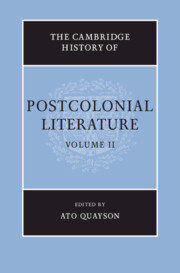Book contents
- Frontmatter
- 21 The language question in India and Africa
- 22 English and the development of postcolonial literature
- 23 Religion and postcolonial writing
- 24 Postcolonial responses to the Western canon
- 25 Island writing, Creole cultures
- 26 Magical realism
- 27 Palimpsest and hybridity in postcolonial writing
- 28 The narrative forms of postcolonial fiction
- 29 Poetry and postcolonialism
- 30 Primitivism and postcolonial literature
- 31 Popular culture and postcolonial literary production in Africa and India
- 32 Film and postcolonial writing
- 33 Fanon, Memmi, Glissant and postcolonial writing
- 34 Negritude and postcolonial literature
- 35 Publishing, prizes and postcolonial literary production
- 36 Key journals and organizations
- Bibliography
- Index
- References
36 - Key journals and organizations
Published online by Cambridge University Press: 28 January 2012
- Frontmatter
- 21 The language question in India and Africa
- 22 English and the development of postcolonial literature
- 23 Religion and postcolonial writing
- 24 Postcolonial responses to the Western canon
- 25 Island writing, Creole cultures
- 26 Magical realism
- 27 Palimpsest and hybridity in postcolonial writing
- 28 The narrative forms of postcolonial fiction
- 29 Poetry and postcolonialism
- 30 Primitivism and postcolonial literature
- 31 Popular culture and postcolonial literary production in Africa and India
- 32 Film and postcolonial writing
- 33 Fanon, Memmi, Glissant and postcolonial writing
- 34 Negritude and postcolonial literature
- 35 Publishing, prizes and postcolonial literary production
- 36 Key journals and organizations
- Bibliography
- Index
- References
Summary
This chapter furnishes a history of key journals and institutions that have shaped the contours of the field of postcolonial studies. Although controversy and debate characterize discussion on the definition, scope and duration of the ‘postcolonial’, the origins of the field are usually located without much dispute around the late 1970s. Customary accounts of the beginnings of postcolonial studies index the cultural, postmodern, literary and textual turn in a line of enquiry which began and developed much earlier in history, political science, and anthropology. The emergence of the ersatz ‘Third World’ in the wake of the 1955 Bandung conference constitutes some of the prehistory of the field, although admittedly under the nametag of ‘Third World’ rather than ‘postcolonial’, and largely within disciplines other than literary studies. Beginnings are notoriously provisional, but even so, the field of what Aijaz Ahmad calls ‘literary postcoloniality’ is not without its own prehistory, one that goes by the name of Commonwealth literary studies (CLS), and has been poorly integrated into usual accounts of the rise of postcolonial studies. Enmeshment in the scope, definition and task of postcolonial studies and contemporary interest in the ‘beyond’ of postcolonial studies – often conceived in terms of the future or as transcending historical colonialism altogether – sometimes displaces a more thorough understanding of its complex origins, its multiple strands and regional dimensions. In each of these areas, key journals and institutions have been instrumental in the development of a rich set of resources for a study of the literature, culture and theoretical insights associated with the experience of colonialism and its aftermath. It is the aim of this chapter to tell that story.
- Type
- Chapter
- Information
- The Cambridge History of Postcolonial Literature , pp. 1155 - 1188Publisher: Cambridge University PressPrint publication year: 2012
References
- 2
- Cited by



